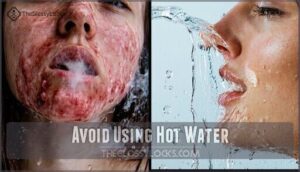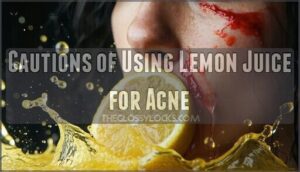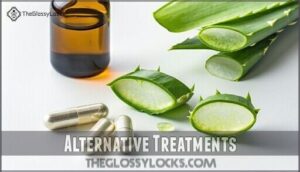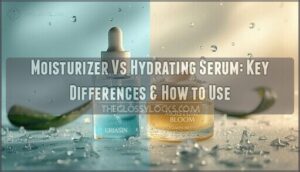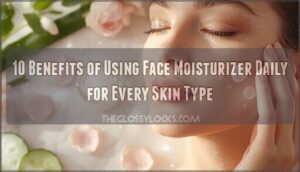This site is supported by our readers. We may earn a commission, at no cost to you, if you purchase through links.

Lemon’s citric acid and vitamin C can help dry out pimples and provide antibacterial benefits. However, it’s highly acidic and can cause irritation, increased sun sensitivity, and even permanent skin discoloration if used incorrectly.
Always patch test first, limit use to 10-15 minutes, and never apply undiluted lemon juice directly to your skin. While some people swear by this kitchen remedy, it’s not suitable for everyone and can backfire if you have sensitive skin.
The devil’s in the details regarding safe application methods.
Table Of Contents
- Key Takeaways
- How Do You Get Rid of Acne With Lemon Juice?
- Lemon Juice for Acne
- Benefits of Lemon Juice for Acne
- Side Effects of Lemon Juice for Acne
- How to Use Lemon Juice for Acne
- Lemon for Acne Scarring
- Lemon Juice Application
- Cautions of Using Lemon Juice for Acne
- Alternative Treatments
- Frequently Asked Questions (FAQs)
- Does lemon juice clear acne?
- Is it safe to apply lemon directly on the face?
- Is lemon clear good for pimples?
- Can I wash my face with lemon juice?
- Can lemon juice clear acne?
- How to use lemon for clear skin?
- Should I wash my face after applying lemon juice?
- How long should I leave lemon on my face?
- Can lemon juice be combined with honey for acne treatment?
- How long does it take to see results from lemon juice?
- Conclusion
Key Takeaways
- Always dilute lemon juice with equal parts water – Pure lemon juice is too acidic and can cause burning, irritation, and permanent skin discoloration if applied directly to your face.
- Patch test first and limit exposure time – Test the diluted mixture on a small skin area for 24 hours before facial application, and never leave it on your face for more than 10-15 minutes to prevent chemical burns.
- Expect increased sun sensitivity and use sunscreen religiously – Lemon juice makes your skin extremely vulnerable to UV damage for days after application, so you’ll need broad-spectrum sunscreen and should limit sun exposure.
- Consider safer alternatives since scientific evidence is limited – While lemon contains antibacterial compounds, there’s minimal research proving its effectiveness for acne, and dermatologist-recommended treatments like tea tree oil, aloe vera, or professional products offer better results with fewer risks.
How Do You Get Rid of Acne With Lemon Juice?
When considering lemon juice acne treatment, you’ll want to proceed with caution despite its popularity as a home remedy.
While lemon for acne offers potential antibacterial properties and vitamin C benefits, Application Best Practices require careful preparation.
Always dilute fresh lemon juice with equal parts water to minimize skin irritation, and test this mixture on a small skin patch first.
Use this acne treatment sparingly as an occasional spot treatment rather than a daily routine.
Lemon Efficacy Doubts exist due to limited scientific research, making dermatologist consultation essential before starting.
The citrus solution can cause dryness, burning, and increased sun sensitivity—serious considerations for your skin health.
Avoid mixing lemon juice with other drying ingredients, and never apply it to broken or irritated skin.
Remember that Long-Term Results aren’t guaranteed, and Alternative Natural Acids might prove more effective for your specific skin needs.
Lemon Juice for Acne
Many people wonder if lemon juice for acne actually works, and the answer isn’t black and white. Lemon juice contains citric acid and topical vitamin C that may help reduce excess oil and bacteria in your pores.
Some acne treatment enthusiasts swear by lemon’s antibacterial properties, which could combat breakout-causing microbes. However, lemon efficacy remains questionable since direct human studies are lacking.
Animal research suggests anti-inflammatory benefits that might reduce redness and swelling, but that doesn’t guarantee it’ll work for your skin types. Different people react differently to this acidic fruit.
A key benefit is vitamin C’s ability to inhibit melanin production. The catch? Pure lemon juice can irritate your skin, increase sun sensitivity, and potentially worsen breakouts.
Always dilute it with water and do a patch test first. Application frequency matters too—overuse can backfire. Before trying lemon for acne, consult a dermatologist who can recommend safer, proven treatments.
Benefits of Lemon Juice for Acne
Lemon juice contains several compounds that may help address acne, including vitamin C, citric acid, and natural antibacterial agents that target breakout-causing bacteria.
While scientific evidence remains limited, these properties suggest potential benefits for reducing inflammation, controlling oil production, and promoting skin healing when used properly.
Rich in Vitamin C
Lemon juice’s vitamin C content packs serious antioxidant power against acne.
This potent nutrient fights free radicals that damage your skin while promoting healthy cell formation. One benefit is natural pigmentation reduction, which helps to even out skin tone.
Here’s how vitamin C transforms your acne lemon treatment:
- Collagen boost – Strengthens skin structure and reduces scarring
- Enhanced skin radiance – Brightens dull, acne-prone complexions
- Improved healing – Accelerates recovery from breakouts
- Reduced inflammation – Calms angry, red pimples naturally
Astringent Properties
Beyond vitamin C, lemon’s high acidity creates powerful astringent properties that naturally tighten your pores and control excess sebum production.
This pore tightening effect helps maintain proper skin balance while reducing the oily conditions where acne thrives.
Natural astringents like lemon juice offer sebum reduction benefits, making lemon for acne treatment particularly effective for oily skin types.
Lemon juice contains compounds that may offer some skin-brightening potential.
| Astringent Effect | Mechanism | Acne Benefit |
|---|---|---|
| Pore Constriction | Tissue tightening | Reduced blackheads |
| Oil Control | Sebum regulation | Less clogged pores |
| pH Balance | Acidic environment | Healthier skin barrier |
Antibacterial Properties
Lemon juice’s antibacterial properties create an acidic environment that combats P. acnes bacteria, the primary culprit behind inflammatory acne.
However, these antiseptic limitations mean lemon alternatives like benzoyl peroxide offer more reliable results without disrupting your bacterial skin balance. A potential benefit is tyrosinase inhibition mechanism, reducing hyperpigmentation.
Here’s what you should know about lemon’s antibacterial effects:
- Acidic pH kills acne-causing bacteria – but may also eliminate beneficial skin microbes
- Resistance development isn’t typically an issue – unlike some conventional acne treatments
- Antimicrobial compounds show promise – though direct skin application carries risks
- P. acnes effects vary by concentration – diluted solutions reduce irritation potential
Anti-inflammatory Effects
Fighting acne inflammation, lemon juice contains compounds that may calm irritated skin.
While animal studies show promising inflammation reduction results, human research remains limited.
The citric acid creates an environment where bacterial inhibition occurs, potentially reducing acne redness over time.
- Lemon compounds like ascorbic acid target skin inflammation markers
- Animal studies demonstrate significant inflammation reduction in controlled settings
- Citric acid’s acidic nature helps control bacterial growth and redness
- Antiinflammatory effects may soothe angry, inflamed acne lesions
- Limited human studies mean results can’t be guaranteed for everyone
Exfoliating
Citric acid acts as a natural exfoliant, sloughing away dead skin cells that clog your pores.
This gentle skin exfoliation helps clear sebum and dirt while potentially reducing blackhead formation.
| Exfoliation Method | Frequency | Skin Type |
|---|---|---|
| Lemon juice diluted | 1-2x weekly | Normal skin |
| Gentle AHA benefits | 2-3x weekly | Oily skin |
| Professional treatment | Monthly | Sensitive skin |
However, lemon enzymes can disrupt your skin’s natural balance.
Always dilute lemon juice for acne treatment and follow with proper post-exfoliation care.
Side Effects of Lemon Juice for Acne
While lemon juice offers potential acne-fighting benefits, you’ll need to keep in mind several side effects before applying it to your skin.
The high acidity in lemon juice can cause dryness, burning, stinging, itching, and redness, particularly with daily use or on sensitive skin.
Dryness
When applying lemon juice to your skin, you’ll likely experience skin dryness as citric acid disrupts your skin’s natural pH balance and lipid barrier.
Lemon juice strips your skin’s protective oils, leaving it parched and vulnerable to irritation.
This over-exfoliation strips essential oils, leading to excessive dryness and increased skin sensitivity.
Without proper moisturizing methods to restore skin hydration, this skin irritation can worsen existing acne conditions.
Burning
Using lemon juice on acne-prone skin can trigger a burning sensation due to its high acidity.
This chemical burn risk increases with skin sensitivity and existing breakouts.
Pain management strategies include:
- Dilute lemon juice with equal parts water
- Apply for shorter durations initially
- Rinse immediately if burning occurs
- Use cool compresses for relief
- Discontinue use if skin burning persists
Stinging
Beyond burning, you’ll likely experience skin stinging when lemon juice contacts your face.
This sharp sensation occurs because lemon’s high acidity disrupts your skin’s natural barrier. Sensitive skin users report intense discomfort, especially on open lesions.
Dilution effects can minimize stinging intensity, but even diluted solutions cause irritation.
Proper application duration and gentle post-treatment care help reduce these uncomfortable side effects.
Itching
Skin itchiness from lemon juice signals your body’s alarm system kicking in.
This skin itching occurs when lemon’s acidity disrupts your skin’s natural barrier, triggering inflammatory responses that can worsen existing breakouts.
Here’s what contributes to itch severity:
- Itch Causes: High citric acid concentration overwhelms sensitive skin
- Chronic Itch: Repeated applications create persistent irritation cycles
- Itch Prevention: Always dilute lemon juice before application
- Itch Relief: Discontinue use immediately if skin reactions develop
Redness
Redness from lemon juice happens when citric acid triggers inflammation and irritation on your skin.
The high lemon concentration can worsen skin redness, especially with frequent application frequency.
If you have sensitive skin, you’re more vulnerable to scarring redness.
While lemon juice has antiinflammatory properties, its acidity often causes more harm than good for acne treatment.
Killing Good Bacteria
Lemon juice’s antibacterial properties don’t discriminate—they eliminate beneficial skin bacteria alongside harmful ones.
This disruption throws your skin microbiome off balance, potentially triggering these concerning effects:
- Weakened skin barrier protection
- Increased susceptibility to infections
- Disrupted gut health connections
- Compromised immune response
- Worsened acne breakouts
Your skin’s bacterial balance matters more than you might think.
Increased Risk of Hyperpigmentation and Sunburn
Using lemon juice creates lemon photosensitivity, dramatically increasing your skin’s vulnerability to sun exposure.
This heightened sensitivity can trigger severe sunburn and worsen hyperpigmentation, especially concerning those with dark skin concerns.
The scarring potential multiplies without proper sunscreen importance practices.
Consider treatment alternatives if you’re prone to sun damage, as lemon juice amplifies increased skin sensitivity to sunlight substantially.
How to Use Lemon Juice for Acne
If you’re considering lemon juice for acne treatment, proper application methods are essential to minimize skin irritation and maximize potential benefits.
The acidic nature of lemon requires careful dilution and cautious use, as improper application can worsen existing skin conditions or create new problems.
Dilute With Water
Before applying lemon juice to your face, you’ll need to dilute it with equal parts water to reduce lemon acidity and prevent irritation.
This dilution creates safer application frequency for sensitive skin while maintaining lemon juice benefits for acne treatment.
Proper dilution ratios protect your skin care routine from harsh citric effects.
You can find products for lemon dilution acne and always use room-temperature water when mixing your lemon juice solution.
Test on a Small Area of Skin
Patch test benefits start with choosing a small application area size like your inner wrist.
Apply diluted lemon juice and wait 24 hours – the duration of test needed for monitoring skin changes.
Watch for allergic reaction signs including redness, burning, or swelling.
This simple step prevents widespread side effects and helps you understand your skin’s tolerance before facial application.
Use Sparingly and for Short Periods of Time
Remember, less is more when treating acne with lemon juice. Application frequency should stay limited—once daily maximum—while contact duration shouldn’t exceed 20-30 minutes to prevent irritation.
Your skin sensitivity dictates the timeline, so monitor for side effects carefully.
- Start with 5-minute applications to gauge your skin’s reaction
- Limit use to every other day initially for sensitive skin types
- Watch for warning signs like excessive dryness or burning sensations
- Adjust timing based on results rather than rushing the process
Avoid Using Hot Water
Hot water amplifies lemon juice’s harsh effects, creating skin barrier damage that worsens acne.
Choose lukewarm water instead to protect your skin’s natural defenses while cleansing.
This simple water temperature adjustment prevents irritation and allows lemon’s antibacterial properties to work effectively.
Cool temperatures offer lukewarm cleansing benefits without the hot water dangers that compromise your acne treatment success.
Do Not Mix With Other Drying Ingredients
Lemon juice shouldn’t be your skin’s only dance partner.
Combining it with other drying agents creates a recipe for disaster through over-exfoliation risks and skin barrier damage.
Smart product sequencing protects your complexion:
- Skip baking soda – creates harsh alkaline reactions
- Avoid alcohol-based toners – doubles drying effects
- Pass on salicylic acid – ingredient interactions cause irritation
- Prioritize hydration importance – moisturize after lemon treatments
Lemon for Acne Scarring
While many online discussions suggest lemon juice can help fade acne scars through its vitamin C content and natural acids, scientific evidence supporting this claim remains limited.
You should consult with a dermatologist before using lemon juice on scarred skin, as the treatment may cause irritation or worsen hyperpigmentation, particularly in darker skin tones.
Limited Scientific Evidence
Scientific evidence supporting lemon juice for acne scarring remains disappointingly sparse. While anecdotal evidence floods online forums with success stories, actual research is virtually nonexistent.
Most studies focus on lemon’s antibacterial properties rather than scar treatment specifically. This study scarcity leaves you guessing about effectiveness and safety.
| Research Area | Evidence Level | Reliability |
|---|---|---|
| Acne scarring | Minimal | Low |
| Antibacterial effects | Limited | Moderate |
| Skin irritation | Well-documented | High |
More research is desperately needed before recommending lemon juice as a legitimate acne scar treatment.
Consult a Dermatologist Before Use
Before trying lemon juice for acne scarring, you should get dermatological advice suited to your skin type and acne type.
Professional scar reduction requires expert acne advice to avoid complications.
Here’s your action plan:
- Schedule a consultation for personalized treatment plans
- Discuss your skin history to prevent adverse reactions
- Learn proper application for preventative acne care
This approach helps you manage side effects while maximizing safety and results.
Lemon Juice Application
You can apply lemon juice to acne-prone skin through three main methods: as a diluted astringent, a targeted spot treatment, or using fresh-squeezed juice for maximum potency.
Each application method requires careful attention to dilution ratios, contact time, and skin sensitivity to minimize irritation while maximizing potential benefits.
Astringent Application
Creating an effective astringent with lemon juice requires proper lemon dilution – mix equal parts fresh lemon juice and water.
Apply this solution to clean skin 2-3 times daily using a cotton pad, focusing on oily areas.
This topical application helps control excess sebum and tighten pores.
For alternative options, consider a pre-made lemon astringent.
Always follow with skin moisturizing to prevent overdrying.
Application frequency matters – start with once daily to test your skin’s tolerance before increasing usage for ideal skin care results.
Spot Treatment Method
Spot treatment targets individual pimples with precision. Saturate a cotton swab with diluted lemon juice and apply directly to blemishes. Application duration should be brief—just seconds for active acne.
**Precision matters—target each pimple individually with diluted lemon juice for just seconds, not minutes.
Frequency guidelines suggest 2-3 times daily, adjusting based on skin sensitivity. Effective acne solutions are available to help clear skin.
Overnight application works for stubborn spots, while scar targeting requires gentler, less frequent use.
- Feel confident tackling breakouts one pimple at a time
- Experience the satisfaction of targeted, precise treatment
- Enjoy gentle control over your skincare routine
- Trust your ability to customize based on skin response
- Embrace natural DIY acne remedies that work with your lifestyle
Use Fresh-squeezed Lemon Juice
Quality matters when choosing lemon juice for your DIY acne remedies. Fresh lemon juice straight from the fruit contains higher concentrations of active compounds compared to store-bought versions loaded with added sugars and preservatives.
Simple squeezing methods using a fork or citrus reamer work best. Juice freshness peaks immediately after extraction, though proper refrigeration extends storage duration to several days.
Remember, even fresh lemon for acne increases sun sensitivity and may irritate sensitive skin.
Cautions of Using Lemon Juice for Acne
While lemon juice offers potential benefits for acne treatment, you’ll need to approach its use with careful consideration of several important risks.
The high acidity of lemon juice can cause skin irritation, increase sun sensitivity, and potentially worsen your acne if you don’t dilute it properly or combine it with incompatible skincare ingredients, which may lead to further acne issues.
Can Cause Irritation
Although lemon juice offers potential acne benefits, it can trigger significant skin irritation that outweighs any advantages.
The citric acid disrupts your skin’s natural pH balance, leading to redness, burning, and stinging sensations.
Those with skin sensitivity face heightened risks of chemical burns and excessive dryness.
Applying lemon juice to open sores can worsen surrounding skin damage and delay healing.
Product interactions with other skincare ingredients may amplify irritation.
Overuse strips beneficial oils, causing inflammation and potentially new breakouts.
- Warning sign: If you experience persistent burning or worsening acne, discontinue use immediately and consult a dermatologist.
Can Increase Sun Sensitivity
After applying lemon juice to your face, photosensitivity risks increase dramatically.
Your skin becomes vulnerable to UV exposure, making sunburn prevention essential.
The citrus compounds in lemon juice make your skin react more intensely to sunlight, potentially causing severe skin damage.
For proper skin protection, apply broad-spectrum sunscreen and limit sun exposure for at least 24 hours after lemon application time.
Without these precautions, you’re trading acne treatment for skin sunburn and hyperpigmentation.
Remember, sun sensitivity from lemon juice isn’t temporary—it can last days after treatment.
Can Worsen Acne if Not Diluted
Pure lemon juice packs serious acidity concerns that can throw your skin’s pH balance completely off track.
When you skip dilution, you’re basically pouring acid directly onto your face, which damages your skin barrier and triggers worsened inflammation.
This aggressive approach often backfires, making acne worse instead of better.
The harsh acidity can even increase scarring risk by irritating already vulnerable skin.
Your breakouts need gentle care, not a chemical assault.
- Always dilute lemon juice with water before applying to prevent skin damage
Can Interact With Other Skincare Ingredients
Mixing lemon juice with other skin care ingredients can turn your routine into a recipe for disaster.
Ingredient interactions create serious irritation potential and exfoliant conflicts that damage your skin barrier.
Product combinations involving lemon juice often amplify photosensitivity risks, especially when paired with retinoids or acids.
The vitamin C in lemon juice may seem beneficial, but combining it with harsh actives increases hyperpigmentation risks.
Photosensitivity becomes particularly dangerous when layering multiple products.
| Ingredient | Risk Level |
|---|---|
| Retinoids | High irritation |
| AHA/BHA acids | Severe dryness |
| Benzoyl peroxide | Chemical burns |
| Hydroquinone | Uneven pigmentation |
| Physical scrubs | Micro-tears |
Alternative Treatments
If you’re looking for acne treatments beyond lemon juice, several research-backed alternatives offer proven benefits with established safety profiles.
These options, including tea tree oil, aloe vera, and zinc supplements, provide targeted approaches to reducing inflammation, controlling bacteria, and supporting skin healing without the photosensitivity risks associated with citrus-based remedies.
Aloe Vera
While lemon juice comes with risks, aloe vera offers a gentler alternative for acne treatment.
This succulent’s gel properties include anti-inflammatory and antimicrobial plant compounds that calm irritated skin without harsh side effects.
Aloe benefits extend beyond immediate relief—it provides essential skin hydration while potentially supporting scar reduction.
Unlike aggressive home remedies, aloe vera works harmoniously with your skin’s natural healing process.
Simply apply pure gel directly to problem areas for a soothing skin care solution.
Eucalyptus
While lemon juice dominates natural acne cures, eucalyptus oil offers compelling skin benefits as an alternative acne treatment.
This aromatic oil contains antimicrobial compounds that target acne-causing bacteria, though research needed to confirm its effectiveness remains limited.
Always dilute eucalyptus oil before application—pure essential oils can irritate sensitive skin.
Try mixing a few drops into your moisturizer or creating a gentle spot treatment.
Remember, these skin care tips require patience and careful usage methods for ideal acne home remedies results.
Green Tea
Why settle for harsh chemicals when green tea offers gentle acne relief?
This antioxidant-rich powerhouse contains EGCG and polyphenols that combat acne-causing bacteria while reducing inflammation.
Unlike lemon juice’s acidic nature, green tea provides natural acne cures without irritation risks.
You can apply cooled green tea directly to affected areas or seek products with green tea extract.
These skin care tips offer effective acne prevention through natural acne home remedies that work harmoniously with your skin’s natural balance.
Rosehip Oil
Rosehip oil offers gentler acne treatment than lemon juice, with proven rosehip oil benefits for inflammation and acne scars.
This vitamin-rich oil promotes cell turnover while supporting collagen production. Choose cold-pressed, organic products through sustainable sourcing for maximum potency.
Unlike harsh retinoids, rosehip oil suits sensitive skin types naturally. The extraction and quality matter – pure oil delivers consistent results over time.
It’s particularly effective for post-acne healing and improving overall skin care routines without irritation.
Sulfur
Beyond traditional treatments, sulfur compounds offer proven antibacterial properties that target acne-causing bacteria effectively.
Unlike lemon juice face treatments, sulfur applications provide gentler skin care solutions.
Consider these sulfur advantages over lemon juice acne treatment:
- Less irritating than acidic alternatives
- Scientifically proven effectiveness for decades
- Safer application with minimal photosensitivity
- Better tolerance for sensitive skin types
- Professional-grade formulations available.
However, sulfur side-effects include potential dryness.
Sulfur alternatives exist, but dermatologist consultation guarantees the best acne treatment selection.
Tea Tree Oil
Another powerful alternative to lemon juice for acne treatment is tea tree oil. This natural remedy contains potent antibacterial compounds that target acne-causing bacteria effectively. Research shows tea tree oil can reduce inflammatory lesions when used consistently.
TTO Application requires careful preparation:
- Always dilute to 5% concentration before skin care use
- Perform patch testing to check for adverse reactions
- Apply only to affected areas using cotton swabs
- Discontinue if TTO Side-Effects like irritation occur
Consult a dermatologist before starting any new acne treatment regimen.
Witch Hazel
Witch hazel offers gentler astringent properties than lemon juice for your acne skin care routine.
This natural extract reduces skin inflammation and tightens pores without harsh acidic effects.
Unlike lemon juice’s photosensitizing risks, witch hazel suits most skin types.
Apply with cotton pads to affected areas twice daily.
Its anti-inflammatory compounds help minimize acne scars while being safer for sensitive skin.
Zinc
Zinc emerges as a powerful acne-fighting mineral that targets inflammation from within.
Zinc deficiency often correlates with persistent breakouts, making oral zinc supplements particularly effective.
Topical zinc formulations also show promise for spot treatment.
Start with lower zinc dosage amounts and monitor your skin’s response.
Unlike lemon juice’s harsh acidity, zinc offers gentler acne control while supporting overall skin care health and healing.
Frequently Asked Questions (FAQs)
Does lemon juice clear acne?
Like using a telegraph to send modern messages, lemon juice shows promise but lacks solid scientific proof.
You’ll find limited research supporting its acne-clearing abilities, though it contains antibacterial compounds that may help reduce breakouts, including its potential to be an antibacterial agent.
Is it safe to apply lemon directly on the face?
No, applying lemon juice directly isn’t safe.
It’s highly acidic and can cause burning, irritation, and increased sun sensitivity.
Always dilute with equal parts water and patch test first to avoid damaging your skin.
Is lemon clear good for pimples?
Studies show lemon’s citric acid may reduce oil production, but there’s limited scientific proof it effectively treats pimples.
You’ll risk irritation, dryness, and increased sun sensitivity, so consult a dermatologist first.
Can I wash my face with lemon juice?
Yes, you can wash your face with lemon juice, but you’ll need to dilute it with equal parts water first.
This acidic mixture may irritate sensitive skin and increases sun sensitivity.
Can lemon juice clear acne?
Could lemon juice be your skin’s secret weapon?
While lemon contains antibacterial compounds and vitamin C that may help fight acne, there’s limited scientific evidence proving its effectiveness for clearing breakouts completely.
How to use lemon for clear skin?
Dilute fresh lemon juice with equal parts water and apply with a cotton swab to clean skin.
Leave for a few minutes, rinse thoroughly, and always use sunscreen afterward since lemon increases sun sensitivity.
Should I wash my face after applying lemon juice?
Always rinse lemon juice off your face after application.
The high acidity can irritate skin and increase sun sensitivity if left on too long.
Use lukewarm water and follow with moisturizer.
How long should I leave lemon on my face?
Leave lemon juice on your face for just 10-15 minutes maximum, then rinse thoroughly with lukewarm water.
Start with shorter periods to test your skin’s sensitivity and avoid irritation or burns.
Can lemon juice be combined with honey for acne treatment?
Yes, you can mix lemon juice with honey for acne treatment.
However, there’s limited scientific evidence.
Honey has antibacterial properties that may complement lemon’s effects, but consult a dermatologist first to avoid irritation.
How long does it take to see results from lemon juice?
You’ll typically need several weeks of consistent application every 1-3 days to notice improvements.
Natural remedies require patience, and results aren’t guaranteed.
Consult a dermatologist if you don’t see progress or experience irritation.
Conclusion
While kitchen-cabinet dermatology might seem appealing, understanding how to get rid of acne with lemon juice requires careful consideration.
You’ll need to dilute properly, patch test religiously, and monitor for irritation.
Though lemon’s citric acid offers antibacterial benefits, it’s not a miracle cure and carries significant risks including burns and hyperpigmentation.
You’re better served consulting a dermatologist for proven treatments rather than gambling with your skin’s health using this potentially problematic home remedy.







